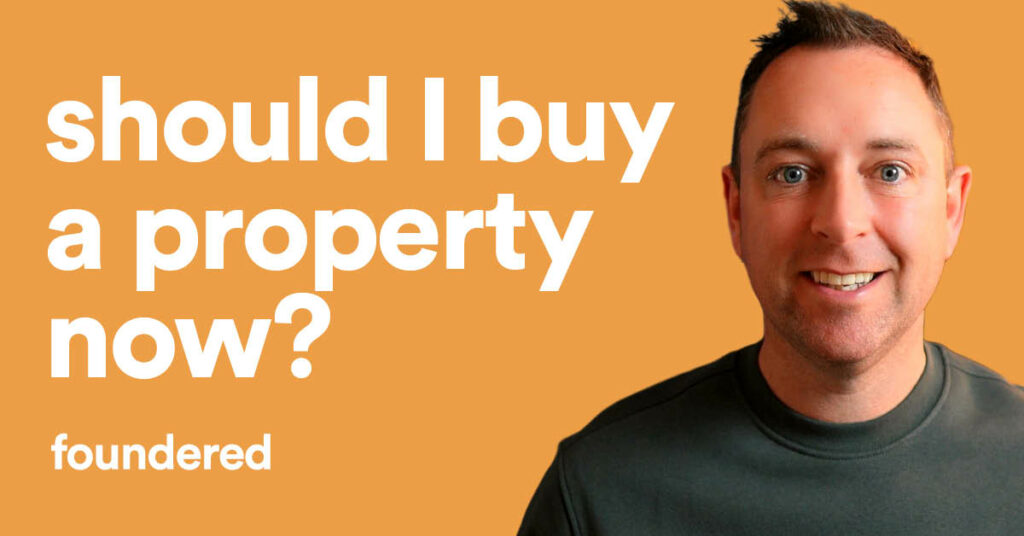If you’re like me, you might flick through the PropertyPal website viewing dream homes, slightly outside of your budget, dreaming about the day you might be able to afford one. I’m just noseying at the pictures for the most part…How the other half live eh?
Property is often regarded as one of the best “investments” anyone can make and I’d generally agree with that. However, if you don’t know what you’re doing, then it can, unfortunately, be one of the worst.
I turned 40 this year and like many my age, we bought our first homes in 2007-2009. Now this timeframe might conjure up some thoughts for you, but I promise if you bought your first home in this time, you’ll remember it and not fondly.
Often these homes are a headache that won’t go away. Many of these properties are in negative equity and unless you’ve made a considered effort to pay down your mortgage, they could be a financially draining “investment”. Now I am one of the lucky ones. We bought our first home just as the markets were rising and put the gains we made into our 2nd home pretty quickly. Even at that, our home today 16 years later isn’t worth the same value we paid for it. Knowing that the property wasn’t going to recover anytime soon, we put our effort into paying down our mortgage as fast as possible and did this over 3 and a half years.
And before you say that’s easy with low-interest rates, we locked in a 10-year mortgage at 5.49% in 2009…Grim, but it focused our attention.
But I appreciate that even today, many people around my age will be in properties that are draining them financially. Either still, in the home, they bought with negative equity or have used that home as a rental property during the era of low interest rates.
Should I buy a property now?
There are many factors outside of our control when it comes to the property market. Are prices going up, or are they going down? And where are they likely to go next? Is supply abundant or scarce? And we also have to consider the highest interest rates in 15 years.
To be honest this topic is too big and too detailed for me alone to tackle. So I’ve enlisted the help of some property experts who each have their own experience and views on Northern Ireland’s Property market.
My thought is that if we bring these minds together collectively, it will help us to make a much more informed decision. Before we get into this, I just want to extend a thank you to each of them, for providing their insight and commentary.
Gerard McClinton ANAEA – Gerard McClinton Estate Agent
The property market here in Northern Ireland is always a talking point. With the current cost of living and interest rate rises what are the facts and figures also, what am I seeing on the ground as an estate agent?
The first thing is that there is the thought that our houses here are too expensive….
So how can we break this down to see how expensive they actually are? There are always a few different reports on house prices floating around so I make sure to get my facts from the likes of the Office for National Statistics, never from newspapers….
We don’t have the second quarter of this year’s stats yet so based on the first quarter of the year 2023 our average house price in NI is £172k.
We have the lowest average house price in the UK with the table standing as follows:
- England – £306k
- Wales – £213k
- Scotland – £187k
- Northern Ireland – £172k.
Then when we take our closest neighbour, the ROI, the average house price there sits at €310k (£264k)
So we are right at the bottom. This to me shows how affordable our housing in NI is for both homeowners and investors. When you compare average salaries in Northern Ireland compared to the top of the leaderboard in England, there’s not a massive difference. Compared to the difference in property prices.
Okay, but the cost of living and interest rates have affected things surely?
Yes, there’s no denying it, they have. These factors are squeezing household spending money across the board. When we have seen the initial interest rate rises there was a slight panic and the market stalled ever so briefly, however, once the nonsense reports fr mainstream media died down and people started to realise the money markets were adjusting their rates, not withdrawing their services, a lot of buyers got back on board again.
Unfortunately, not all could come back to the market but most of them had to readjust and reconsider their affordability and what they now could actually buy.
Even today, there are still more buyers than sellers, and we still have a lack of housing, which is not being met. Not only in the general demand from homeowners and investors but the basic need for housing in NI full stop.
I am seeing a growing appetite from investors looking to buy on a big scale here in NI. A lot of these investors are from NI but many are from the ROI and UK also as our area continues to be seen as an area of potential massive growth from those “outside looking in”.
What do I see happening with the market?
Honestly, I have no idea. What I do know is the massive appetite for owning a home remains, a general lack of housing, money while a bit more expensive this year is still being lent and borrowed and while all of this is happening, houses will sell and the market will move as normal.
Tom Cardwell – Negative Equity NI
History repeating itself?
The hysteria around the property market since Covid has been very worrying. The mortgage industry was doing backflips over 95% and 100% mortgages. Agents were doing cartwheels over the huge surge in demand, price increases and rent rises. Somehow it became a perverse badge of honour for tenants to queue in line begging to rent a property, or first time buyers bidding prices up well above the asking price and setting themselves up for future problems.
Unless you’ve spent the last 15 years hiding in a cave, you’ll know that these types of behaviour are exactly what happens before property prices fall. When interest rates are artificially low, property prices increase beyond intrinsic value. At the time of writing the Bank of England base rate is 5%. Many commentators are correct when they talk about lack of supply and how expensive renting is, though bear in mind we had a serious supply issue in 2008 when the market crashed spectacularly. Thousands of homeowners and landlords throughout Northern Ireland and the rest of the UK are still paying the price for simply taking the wrong mortgage at the wrong time, and it is happening again.
A recent example of customers we have helped. We’ll call them Margaret and Stephen. They bought their first home, a flat, in 2007. They were advised to take an interest only mortgage. They put down a £20,000 deposit ( from the bank of Mum and Dad ), and borrowed £180,000, a total of £200,000 for a small 2 bedroom flat in Belfast. Fast forward 16 years to January 2023. They now have 2 children. They have moved to a rental property as they needed the space, and they still have their flat which is rented out, but losing money and in negative equity. They have decent incomes but can’t afford to save a deposit to buy a family home. Between childcare, rent and topping up the rental income from the flat, they are treading water financially.
They can’t afford to change the mortgage on the flat to repayment; it is now only worth £135,000 so £45,000 of negative equity. The £300 they would like to save towards a deposit for a home of their own is topping up the rent to cover rates, mortgage, service charges, insurance etc. As well as being grossly unfair, this situation can be incredibly stressful as I’m sure you can imagine. There is no “light at the end of the tunnel” – even if the property breaks even before the mortgage term ends in 2032, they will still lose a further £40,000 odd on top of the lost deposit just to walk away with nothing.
So what can they do? We reviewed Margaret and Stephen’s finances and found that they qualified for a negative equity settlement. They instructed us to manage the disposal of the property ( referred to as a shortfall sale ). The sale agreed price was £132,000, leaving a total negative equity balance of just over £51,000 to include solicitor and estate agent costs. We then agreed on a settlement plan totalling £17,340 which they have chosen to repay over 60 months at £289 per year without interest.
A debt write-off of £33,660, and the property problem gone. This type of settlement will inevitably harm their credit rating however they knew this from the outset and felt that the problem was never going away unless they took action. Thankfully credit impairment can be corrected over time and they are a step closer to the previously impossible goal of owning a suitable family home.
We have helped 1000s of people through Northern Ireland and the rest of the UK with similar problems. I don’t believe that property prices will fall like they did in 2008 but sadly there will be big financial problems for the first time buyers and landlords who have overpaid for property post-Covid. How quickly these issues manifest and to what extent, time will tell.
Owen Peden – PropertyPal Mortgages
Despite the rising mortgage rates, there is sustained interest among First Time Buyers. These buyers are well-informed about the impact of the current interest rate environment on their budget. Rather than being deterred from buying, they are reassessing the most appropriate price range for their purchase.
Most purchasers are opting for short-term fixed-rate mortgages as a proactive measure against potential future increases. They appreciate the stability and security that come with a short-term fixed rate and remain hopeful that more favourable rates will be available once their fixed term expires.
For existing mortgage customers grappling with higher mortgage payments, we are actively seeking solutions to ensure their payments remain affordable. An increasing number of our clients are considering mortgage term extensions as a means to mitigate the impact of significant rate hikes. By extending their mortgage term, they aim to temporarily ease the burden of increased payments, with the intention of reevaluating and potentially reducing the term during their next review.
If your current mortgage deal is due to end within the next 6 months, we would strongly recommend you contact a mortgage broker to start reviewing your options sooner rather than later.
Martin McAuley – Lofty Property Investments
In relation to the current market I guess my advice is to approach with caution but in reality that’s generally always the advice I would give.
If you’re considering buying property for investments such as a rental project whether that be a simple buy-to-let, HMO or holiday let, then make sure to pay close attention to the cash flow situation of any deal. “Know your numbers” is something I say regularly and always know your expected Return on Investment.
One consideration many property investors decide on is to consider locking in mortgages for longer periods. This way they have an understanding of their potential cash flow in advance of the project starting and they maintain a steady cash flow. This is especially important with interest rates rising, however, can lead to overpaying on your mortgage costs if locked in at a high rate. It’s not an easy call, but one you need to be comfortable with.
With all that said, I would still encourage buying!
And I would also add that a focus is to buy below market value! The cheaper you buy the property against its market value, the better position you are in.
Remember, property investing is a long-term strategy. Achieving a strong monthly cash flow is vitally important but don’t forget to consider long-term capital growth.
Final thought
I’m regularly asked by readers to give a comment on property and it’s something I struggle with. Buying a home is not just a financial decision. It’s an emotional one and often emotions persuade us to make less-than-optimal choices.
In my own experience and working with clients, my advice will always be “never to buy too much home”. Having headroom in your budget means that you can weather any storm and that includes increased interest rates or potential job loss (make sure you have an emergency fund).
The biggest and nicest home might be nice to live in, but I guarantee you, sleeping soundly in your bed each night without the worry of losing it is so much better.
If you’re buying property as an investment, remember to make sure the numbers work from an investment perspective and stress test this with rising interest rates or unoccupancy for a few months.


